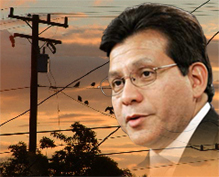At that appearance, Gonzales confined his comments to the National Security Agency's warrantless wiretapping program, saying that President Bush had authorized it "and that is all that he has authorized."
But in yesterday's letter, Gonzales, citing that quote, wrote: "I did not and could not address . . . any other classified intelligence activities." Using the administration's term for the recently disclosed operation, he continued, "I was confining my remarks to the Terrorist Surveillance Program as described by the President, the legality of which was the subject" of the Feb. 6 hearing.
Shorter version: Bush has been engaged in more warrantless spying on Americans than the Administration has disclosed to date.
At least one constitutional scholar who testified before the committee yesterday said in an interview that Gonzales appeared to be hinting that the operation disclosed by the New York Times in mid-December is not the full extent of eavesdropping on U.S. residents conducted without court warrants.
"It seems to me he is conceding that there are other NSA surveillance programs ongoing that the president hasn't told anyone about," said Bruce Fein, a government lawyer in the Nixon, Carter and Reagan administrations.
Sen. Russ Feingold called Gonzales' misleading Senate testimony right away. From his Feb. 7 statement, delivered on the Senate floor:
....the President's Attorney General has already shown a willingness to mislead the Congress. At the hearing yesterday, I reminded the Attorney General about his testimony during his confirmation hearings in January 2005, when I asked him whether the President had the power to authorize warrantless wiretaps in violation of the criminal law. We didn't know it then, but the President had authorized the NSA program three years before, when the Attorney General was White House Counsel. At his confirmation hearing, the Attorney General first tried to dismiss my question as "hypothetical." He then testified that "it's not the policy or the agenda of this President to authorize actions that would be in contravention of our criminal statutes."
Well, Mr. President, wiretapping American citizens on American soil without the required warrant is in direct contravention of our criminal statutes. The Attorney General knew that, and he knew about the NSA program when he sought the Senate's approval for his nomination to be Attorney General. He wanted the Senate and the American people to think that the President had not acted on the extreme legal theory that the President has the power as Commander in Chief to disobey the criminal laws of this country. But he had. The Attorney General had some explaining to do, and he didn't do it yesterday. Instead he parsed words, arguing that what he said was truthful because he didn't believe that the President's actions violated the law.
But he knew what I was asking, and he knew he was misleading the Committee in his response. If he had been straightforward, he would have told the committee that in his opinion, the President has the authority to authorize warrantless wiretaps. My question wasn't about whether such illegal wiretapping was going on - like almost everyone in Congress, I didn't know about the program then. It was a question about how the nominee to be Attorney General viewed the law. This nominee wanted to be confirmed, and so he let a misleading statement about one of the central issues of his confirmation - his view of executive power - stay on the record until the New York Times revealed the program.
The rest of the Attorney General's performance at yesterday's hearing certainly did not give me any comfort, either. He continued to push the Administration's weak legal arguments, continued to insinuate that anyone who questions this program doesn't want to fight terrorism, and refused to answer basic questions about what powers this Administration is claiming. We still need a lot of answers from this Administration.
[Graphic created exclusively for TalkLeft by CL.]




